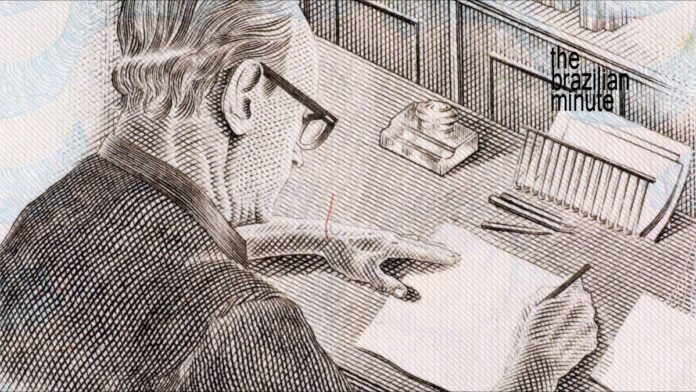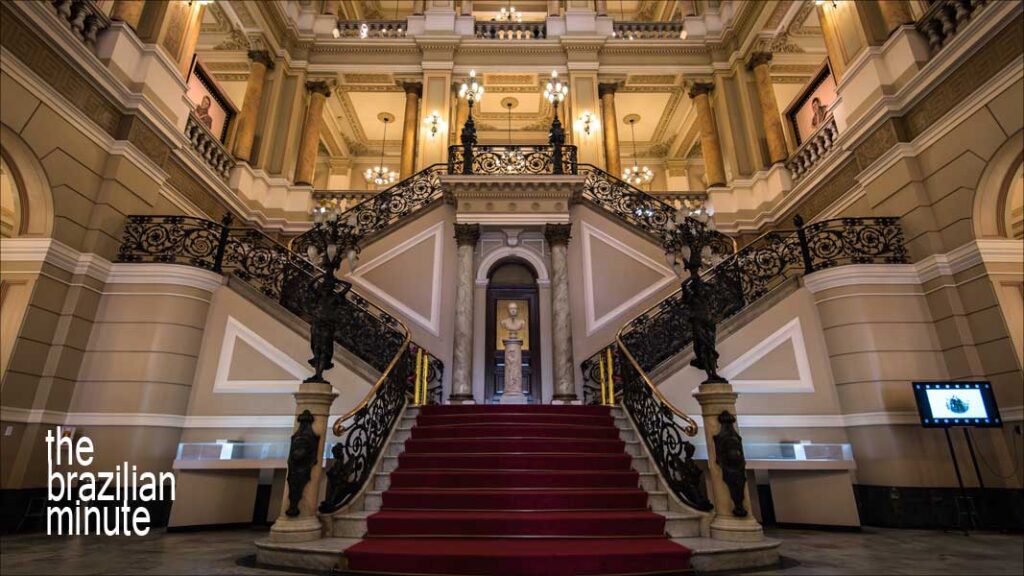
Brazil’s National Book Day is October 29th. Let’s explore Brazilian literature.
Brazil’s Literary Masters have created a foundation that is unique throughout South America, spawning generations of celebrated authors, poets, philosophers, visionaries, and novelists.
Presented by the Consulate-General of Brazil in Chicago and the Brazilian Foreign Ministry’s Cultural Department.
In celebration of Brazil’s Bicentennial year, 1822 – 2022
This week’s Brazilian Minute: Brazil’s Literary Masters
(Audio not available)
Catch up with other Brazilian Minute episodes you may have missed!
Script from Audio:
Brazil’s National Book Day is October 29th. Let’s explore Brazilian literature with three of Brazil’s best.
Machado de Assis is Brazil’s most celebrated novelist, poet, and playwright. Grandson of freed slaves, his intellect and curiosity shaped Brazil’s realism movement. His greatest works include 1899’s Dom Casmurro.
Modernist Jorge Amado is well-known in the US. Clever, challenging, and optimistic, his novels have made it to both stage and screen. These include Dona Flor and Her Two Husbands, Saravá, Tieta, and 1982’s Kiss Me Goodbye.
Rio-born Adriana Lisboa is one of Brazil’s brightest literary stars. Having lived in France, New Zealand, and Texas, her stories about today’s Brazil reflect the homeland perspectives of Brazilians living in other countries and cultures.
Importantly, each of these authors has books translated into English.
Read and listen to new weekly episodes of The Brazilian Minute.

Brazil’s Literary Masters
Overview:
A standout moment for Brazilian culture occurred on October 29th, 1810 with a magnanimous gesture by Portugal’s Dom Joao VI. He bequeathed thousands of volumes selected from the Royal Portuguese Library in Lisbon to the Biblioteca Nacional do Brasil. The National Library of Brazil.
Today, a visit to Brazil’s National Library in Rio de Janeiro will bring you front and center with the bibliographic and documented heritage of Brazil. With more than 9 million items, it ranks as the world’s seventh largest.
- Brazil’s National Book Day is observed every October 29th to acknowledge this important moment in the nation’s cultural history.
As you will discover, Brazil’s literary foundation is unique throughout South America. Its imprint has spawned generations of celebrated authors, poets, philosophers, visionaries, and novelists.
Let’s explore.
Literary Upheaval
The story of Brazil’s National Library is a real page-turner.
In 1775, a violent earthquake destroyed Portugal’s Royal Library in Lisbon. Considered to be one of Europe’s finest libraries, the building was a total loss. Ultimately 60,000 items were salvaged and placed in safekeeping.
Napoleon’s 1807 advance into Iberia prompted the Royal Family to relocate the seat of the Portuguese Empire to Rio de Janeiro, and with them came its Royal Library.
Brazil’s National Library occupied several locations before a purpose-built edifice was constructed at its current location. The building was inaugurated at Avenida Rio Branco, 219 in Rio de Janeiro’s Cinelândia Square, in 1910.
Literary Introductions
Here’s a pair of interesting facts.
First, Brazil began to publish its own books in 1808, with the founding of the Imprensa Régia, the official press of the Royal Order.
Second, Tomás Antônio Gonzaga is credited as Brazil’s first published author, with a book of poetry published in three volumes and titled Marília de Dirceu. The book’s first volume is a collection of poems about his love for Marilla, a girlfriend.
The cultural measure of Brazilian literature is vast and inclusive. Generations of Brazilian authors, poets, researchers, and novelists have popularized reading and literary appreciation nationwide.
Let’s introduce you to several of Brazil’s literary masters.
Monteiro Lobato
Importantly, Lobato is celebrated as one of the first Brazilian writers to write books for children. Educational and entertaining, many of these were set in the fictional Sítio do Pica-Pau Amarelo (The Yellow Woodpecker Farm). Consequently, these books became the basis for televised series. Lobato also founded one of the first publishing houses in Brazil.
José de Alencar
Alencar is regarded as one of Brazil’s most influential Romantic novelists of the 1800s. He was also a statesman who focused on the advancement of a unique Brazilian literary tradition termed ‘Indianism’ into the country’s mainstream. His writings are held in high regard.
Clarice Lispector
Ukrainian-born, Lispector came to Brazil as an infant. She grew to become an internationally acclaimed novelist and short-story writer. She spent time traveling and living abroad in Europe and the USA. These experiences shaped her style of writing, often set against highly personal topics, including intimacy and self-reflection. Curiously, although she died prematurely in her 50s, Lispector is viewed as one of the most important Brazilian literary masters of the 20th century.
Machado de Assis
Machado de Assis holds the honor of first president of the Brazilian Academy of Letters, and his books should be on the reading list of anyone wanting to explore Brazilian literature. Ultimately, his life personifies the promise of being Brazilian. As the grandson of freed slaves, he was self-taught. Impressively, he rose through both intellectual and social ranks to achieve an unequaled legacy as Brazil’s Literary Master.
Graciliano Ramos
An important voice for Brazilian modernism, Ramos portrayed life in the Sertão and the northeast of Brazil in his celebrated novel, Vidas Secas. Ramos. Today, a bronze statue of his likeness can be found on the beach at Ponta Verde, in Maceió, Alagoas.
Carlos Drummond de Andrade
Appreciated worldwide as a well-considered author, de Andrade is often referred to as Brazil’s greatest poet. Ultimately, his writings were so powerful and thought-provoking that he has become a cultural icon. Verses from his Canção Amiga (Friendly Song) were printed on Brazilian currency in 1989-90. We recommend A Rosa do Povo as a starting point for his body of work.
Cecília Meireles
As a well-traveled lecturer and educator, Meireles excelled in several literary arenas, penning children’s books, novels, and most notably, poetry. Meireles would constantly explore new literary influences throughout her life, and from wide-ranging life experiences. Impressively, her writings are brilliantly unclassifiable. Her knack for languages and poetry elevated her to fame within the world of literature.
Gilberto Freyre
Freyre’s 1933 tome, Casa-Grande & Senzala (The Masters and The Slaves) retains its status as a contemporary cultural touchstone. It offers insight into the development of Brazilian society as an anthropologic classic easily found and digested via its English editions. Of great interest is Freyre’s sociological perspective, having lived, studied, and taught in Austin Texas, and Stanford, California beforehand. Importantly, its portrayal of black heritage in Brazil, without the prevailing connotations of racism in modern times.
Lygia Fagundes Teles
As both a novelist and short story author educated in law, Teles followed both pathways to receive the Camões Prize in 2005. It is the greatest literary award of the Portuguese language. She was honored with Brazil’s Order of Rio Branco in 1998 and nominated for the Noble Prize in Literature in 2016. Ultimately, her most recognized novel is As Meninas, the story of three young women living during Brazil’s politically challenging 70s.
Music, Travel, Friends, and Fun! 2022 marks Connect Brazil’s 25th year.
Brazil’s Literary Masters
Did you enjoy ’Brazil’s Literary Masters’? If you did, why not join us at Connect Brazil?
Sign up for our emails on Brazilian music, travel, friends, and fun. Listen to our ‘always live’ streaming station and streaming music channels, always free. Visit us on Facebook, and Twitter, and browse our Lifestyle Directory for Brazilian events coast to coast.










